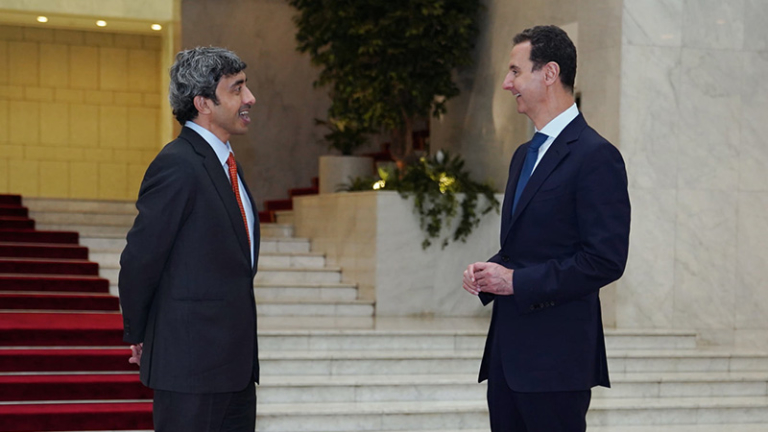
With the approaching date of the next Arab Summit to be hosted by Algeria in March 2022, some member countries of the League of Arab States have become more vocal about their preference for Syria’s return to the organization. Statements by leaders, especially those of Algeria, Egypt, Jordan, Qatar, and the United Arab Emirates, indicate that each of these countries has its own rationale and interests for endorsing or opposing this goal.
The Arab Role in the Rehabilitation of Assad
With the beginning of the Syrian revolution in 2011, most Arab countries sided with and supported the Syrian opposition by providing it with financial, political and military means to fight the Assad regime. In 2012, the League of Arab States decided at its March 5-7 meeting in Doha to allow the representative of the Syrian opposition, the head of the National Coalition for Syrian Revolutionary and Opposition Forces, Moaz al-Khatib, to attend the meeting that year and formally take Syria’s vacant seat. In his speech, he urged the participants to support the Syrian people and the opposition and to charge the Assad regime with responsibility for the war crimes being committed in the country.
At the beginning of the Syrian uprising, most Arab countries supported the Syrian opposition and provided it with financial, political and military means to fight the Assad regime.
A few years later, some of Arab states even lobbied to send forces to Syria. The Kingdom of Saudi Arabia, in particular, was frustrated by the lack of action by the Obama Administration and asked that Arab troops be considered for a peacekeeping mission. Russia, however, strongly opposed this idea, one that was also not supported by President Barack Obama.
In 2017, the Gulf crisis precipitated a division between Qatar, on the one hand, and Saudi Arabia, Bahrain, and the UAE, on the other. These new dynamics and their aftermath had great impact on the Syrian crisis and on the Arab states’ support for the Syrian opposition.
The Gulf crisis of 2017 had great impact on the Syrian crisis and on the Arab states’ support for the Syrian opposition.
Russia was able to gain momentum at that time and, by relying on Iranian militias, took control of most of the lands that were held by the Syrian opposition. The Arab position on Syria was split. Countries such as Egypt and the UAE, which previously had supported the opposition, took a completely different approach and backed the return of the Assad regime to the Arab League and public normalization with it. On November 9, 2021 the UAE foreign minister Abdullah bin Zayed visited Damascus and met with Syrian President Bashar al-Assad. This was preceded by several steps, such as the UAE opening its embassy in Damascus at the end of 2018 and Jordan returning its ambassador to the capital city. In October 2021, following a visit by Jordan’s King Abdullah II to Washington, the king made a phone call to Bashar al-Assad, the first such contact in nearly 10 years.
After the visit of the UAE foreign minister to Damascus, Algerian Foreign Minister Ramtane Lamamra called for Syria’s return to the Arab League. He said that his country, which will host the upcoming Arab Summit in March 2022, is looking forward to an Arab consensus in this regard. He said that Algeria was originally against the vacancy of the Syrian seat; this position was later supported by the Algerian President Abdelmadjid Tebboune when he said that Syria should return to the league—without entering into any discussion about why Syria’s membership was suspended in the first place. Perhaps Algeria’s opposition to freezing anyone’s membership and its refusal to re-open the Syrian war file is affected by the Arab League action regarding the Algerian civil war in the 1990s, which ended without assigning accountability for the crimes committed at that time.
The Arab countries are seeking to rehabilitate Assad without any discussion of international agreements related the political transition and accountability mechanisms in Syria.
On the other hand, the active role that the United Arab Emirates is playing to welcome the Assad regime back to the Arab League shows the extent of the increased influence this Gulf state wields in the region today. Egypt also pushed for such normalization. Egyptian Foreign Minister Sameh Shoukry met his Syrian counterpart, Faisal al-Mekdad, on the sidelines of the United Nations General Assembly last year. These Arab countries are seeking to rehabilitate President Bashar al-Assad without discussing the implementation of international agreements and the failure of the Assad government to abide by any of the UN Security Council resolutions related to the political transition in Syria. Resolution 2254 is especially important and it addresses the failure to apply any accountability mechanism to crimes committed by the Assad regime, such as indiscriminate shelling, torture, siege, starvation, barrel bombs, and other means of killing and destruction used against the Syrians people.
Although the argument is made that returning Assad to the Arab League fold would distance him from Iran, this is practically and politically inconceivable.
Although the argument made by some of Arab officials that returning Assad to the Arab League fold would distance him from Iran, everyone realizes that this is practically and politically inconceivable, as Iranian militias control many military sites and monopolize Syrian economic and service sectors. Assad also will choose Iran in any outcome, especially since the Islamic Republic continued to support his regime during its the worst activities. To be sure, the rapprochement with the Assad regime within the Arab states reflects the lack of human rights concerns and the total absence of a system of accountability within the Arab League.
Russia’s Pivotal Role
Russia played an important role in reviving the Assad regime starting in 2017, after Moscow’s full military intervention in September 2015, which enabled Assad to control most of the areas that were under the control of the opposition. Then, in 2018, Russia launched a public relations campaign, at the international level, in which it announced the end of the war in Syria, the start of the reconstruction process, and international efforts for the return of Syrian refugees and displaced persons to their cities and villages of origin. Russian Foreign Minister Sergey Lavrov reiterated the need for the return of Syrian refugees to Syria as a “safe” country and expected to get results quickly. But nothing to that end has been achieved on the ground.
Russian President Vladimir Putin appointed General Dmitry Mezentsev to coordinate these efforts for the return of Syrian refugees from neighboring countries, before he was dismissed after nearly two years for corruption-related issues. However, the UN High Commissioner for Refugees and other UN agencies have determined that conditions are not currently in place for the return of Syrian refugees.
The Russian proposal at the time in 2018 was realistically saying that the Syrian regime “lacks the equipment, fuel, other material, and funding needed to rebuild the country in order to accept refugee returns.” Russia realizes today that millions of Syrian refugees will not return, especially that they do not have homes to return to after the Assad regime’s destruction of their villages and cities. This is also what informs the American and European position, that reconstruction and the return of refugees are closely linked to the political transition. It is important to mention here that Russia’s active role filled the vacuum created by the lack of US actions in Syria.
Russia lobbied hard to encourage Gulf countries to reinstate the Syrian government’s seat in the Arab League and normalize bilateral relations with the Assad regime.
Afterward, Russia lobbied hard, especially the Gulf countries, to encourage them to reinstate the Syrian government’s seat in the Arab League and normalize bilateral relations with the Assad regime. Russian Minister of Foreign Affairs Lavrov visited United Arab Emirates, Qatar, and Saudi Arabia to raise this issue and mentioned it in press conferences with his counterparts. Indeed, to rehabilitate the Assad regime was Russia’s top agenda item.
The United States and Syria
The Biden Administration’s passivity in dealing with the Syria file while viewing the country only through the lens of humanitarian aid encouraged these Arab countries to normalize with the Assad regime. However, US Secretary of State Antony Blinken has made it clear that Washington’s policy in Syria aims to continue offering humanitarian aid as well as to confront the Islamic State, maintain pressure on the Assad regime, and support local cease-fire agreements. He added, “What we have not done and what we do not intend to do is to express any support for efforts to normalise relations or rehabilitate Mr Assad or lifted a single sanction on Syria or changed our position to oppose the reconstruction of Syria, until there is irreversible progress toward a political solution.”
The Biden Administration’s passivity in dealing with the Syria file while viewing the country only through the lens of humanitarian aid encouraged these Arab countries to normalize with the Assad regime.
But the Biden Administration decided not to activate its diplomacy to prevent this normalization between some Arab countries and the Assad regime, as the Trump Administration did in the past when it sent its envoys to the region, warning them of the danger of sanctions if any steps of rapprochement with the Assad regime were taken. Some countries have taken advantage of Washington’s desire to help Arab countries affected by the Syrian crisis, such as Jordan and Lebanon, to announce steps of normalization with Assad. The Biden Administration must thwart attempts to normalize with Assad by preventing the Assad regime from securing funds for reconstruction projects that will be covered by the Caesar Syrian Civilian Protection Act of 2019.
The scale of the crimes that took place in Syria points to the fact that peace cannot be achieved without justice. Therefore, the justice system is a major and indispensable tool for paving the way toward reconciliation. It must always be remembered that closing the door of transitional justice in society will encourage individual—and even collective—revenge, which has become one of the features of the war in Syria today due to the absence of mechanisms of justice and their application among Syrians.
The Biden Administration should encourage the Arab states to work with the principle of transitional justice during this critical period in Syria. Unfortunately, however, the Arab League has no regard for the concept of justice.

